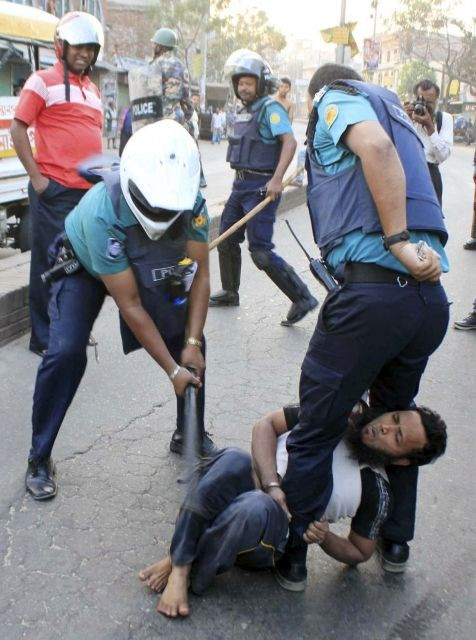Bangladesh Turns Violent Following Islamist Leader’s Death Sentence; At Least 42 Killed

A death sentence handed to Bangladesh’s Islamist leader, Delwar Hossain Sayeedi, over war crimes committed during the country's 1971 war of independence sparked violent riots in the country that left at least 42 people dead, news agencies reported Friday, citing authorities.
Sayeedi, 73, vice president of the Jamaat-e-Islami party, was sentenced on Thursday after he was found guilty of charges of mass killing, rape, arson, looting, and forcing Hindu minorities to convert to Islam during Bangladesh’s 1971 split from Pakistan, lawyers and tribunal officials said.
The verdict was cheered by his opponents, but supporters of his Jamaat-e-Islami party clashed with police, attacked government offices and uprooted railway tracks in parts of the country, the Associated Press reported. Protesters also set fire to dozens of houses belonging to government supporters.
Police used bullets and tear gas to contain the unrest, the report said. The casualties included six policemen, three of whom were beaten to death in the northern Gaibandha district, in a Jamaat protest involving about 2,000 supporters.
Police said a Hindu temple and properties belonging to Hindu families had been attacked in Noakhali, the BBC reported.
The government said that security forces were put on high alert across the country as Jamaat supporters planned more protests on Friday. An additional 10,000 paramilitary border guards were deployed to tighten security, the report said, citing the home ministry, which is in charge of law and order.
Sayeedi’s lawyers said they plan to appeal the tribunal’s verdict in the Supreme Court.
Sayeedi is the third politician to be sentenced by the tribunal. The first two verdicts by the tribunal set up in March 2010 came earlier this year. A former Jamaat leader, Abul Kalam Azad, was sentenced to death in absentia, while another leader, Abdul Kader Mullah, was handed a life sentence.
Both of the earlier verdicts sparked protests by Jamaat supporters even as counter-demonstrations were held by supporters of the tribunal, who demanded death sentences for those responsible for abuses and war crimes during the war.
The Awami League-led government set up the war crimes tribunal in March 2010 to investigate war crimes committed by Bangladeshis.
Jamaat-e-Islami, a key ally of the country's largest opposition party, the Bangladesh Nationalist Party, accuses the government of using war crimes charges to try to curb the opposition party's activities. Jamaat-e-Islami had campaigned against Bangladesh's independence but denies it was behind any human rights violations. Official estimates say more than three million people were killed in the war.
© Copyright IBTimes 2024. All rights reserved.






















